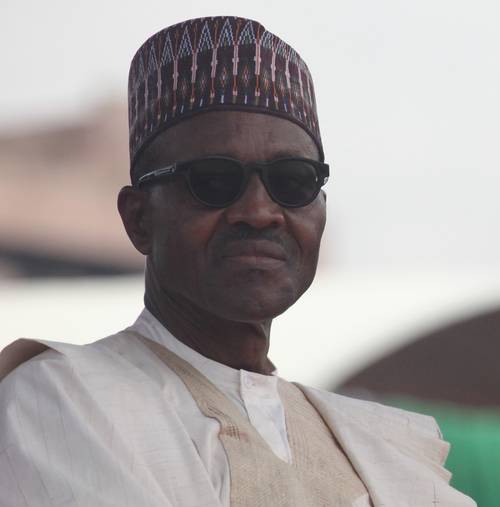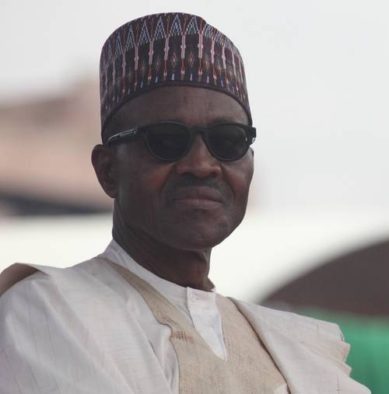National Issues
In defence of Buhari’s anti-corruption war -By Dan Amor


Muhammadu Buhari during the inauguration day.
For most dispassionate observers of the Nigerian political scene, the only thing which has destroyed the fabric of this country even more than any conventional war, is corruption. This hydra-headed monster has seemingly become Nigeria’s middle name. Aside from the untoward image this menace has wrought on the country and the insult and embarrassment it has caused innocent Nigerians abroad, it has inflicted irreparable damage to the basic foundations that held the country together. Corruption has stunted our economic growth, our social and physical infrastructure, our technological and industrial advancement and has decapitated our institutions, which is why our over 40 research institutes are no longer functional because they are headless.
Even our academic and military establishments and other security agencies cannot, in all sincerity, be exonerated from the deadly effects of unbridled corruption. The determination of President Muhammadu Buhari to combat corruption and to go after suspects irrespective of their ethnic or political leanings should enlist the sympathy of all well-meaning Nigerians. It is the more reason why even the opposition Peoples Democratic Party, PDP, which controlled the central government and a greater number of the 36 states and the Federal Capital Territory, Abuja, recently endorsed the corruption war.
As Nigerians we certainly do not need any soothsayer to tell us that ours is a corrupt country. We see corruption live everyday. We see Mr. Corruption stalk the streets, the roads and the highways across the country. We see Mr. Corruption bid us goodbye at the airports and welcome us back into the country. We Nigerians greet Mr. Corruption at the seaports and border posts as we clear our cargoes into the country. We shake the juicy hands of Mr. Corruption as we savour the winning of a lucrative contract. Truly, Nigeria, which in 1996 was ranked by Transparency International as the second most corrupt country in the world, achieved the utmost when in 1997, it was voted the most corrupt country on the face of the earth. Ever since, the country has had the misfortune of being grouped among the five most corrupt countries in the world. There can never be any stigma as heinous as this in the comity of nations across the world.
Since the current democratic political experiment started in May 1999, all successive governments have had to place anti-corruption war as part of their programmes of action, popularly known as manifestos or agendas. Yet, all had paid lip service to the fight against corruption except the current administration of President Muhammadu Buhari which is showing signs of its determination to tackle the monster head on. As can be deduced from the body language and actions of the President himself, Nigerians are now confident that this battle will commence with the resoluteness it deserves. Successive administrations, in spite of their much vaunted hoopla over corruption war, were ironically refuting the claims of the Berlin-based Transparency International (TI) that Nigeria was stinking with the evil stench of corruption.
For instance, in 2004 following TI’s categorization of Nigeria as the third most corrupt country in the world, the Olusegun Obasanjo administration, instead of looking inwards and soberly reassessing its anti-corruption programme to find out why the campaign had neither secured credibility even among Nigerians nor yielded any positive dividends worth commending, decided to lambast the agency. Unfortunately, the government did not sound convincing to Nigerians. That the government had tried to dismiss the TI verdict did not make the unwholesome factors that informed the reports disappear. Besides the COJA profligacy and bazaar and the allegation that various state governors were exporting state allocations monthly, there was also the theatre of shame in the National Assembly where quarrels over sharing of state funds had led lawmakers to assault each other.
Indeed, until the exit of the former chairman of the Economic and Financial Crimes Commission (EFCC), Mallam Nuhu Ribadu, the Commission saw nothing wrong, heard nothing wrong and did nothing about former President Obasanjo or any of his ministers and advisers in spite of mounting evidence of stinking corruption that is now in the public domain, including the Siemens bribery scandal, the Petroleum Technology Development Fund, the Transcorp shares, and the Schneider scandals. As if there is an atmosphere of total impunity, we behave as though we don’t care about other corruption scandals that have rocked the national boat. These include the National Integrated Power Projects in which over $16.5 Billion was stolen, the Aviation Fund, the Petroleum Equalisation Fund, the Rural Electrification Agency scandal, the Federal Government Borehole Project, and the Halliburton Bribery scandals. There are still the Universal Basic Education Commission scandal, the National Identity Cards Project scandal, the Independent National Electoral Commission, the Nigerian Ports Authority scandals, and the N1.1Billion National Gallery of Arts fraud, etcetera.
Lest we forget, the Jonathan administration actually exposed some of these frauds but lacked the political will to prosecute the offenders. While the Managing Director and Executive Vice Chairman of the Power Holdings Company of Nigeria, PHCN, and two of his Executive Directors were being sacked as a result of the turmoil in the power sector against the backdrop of the $16.5Billion House of Representatives Power Probe, the then Chairman of National Electricity Regulatory Commission (NERC) and six of his commissioners were removed over an alleged N1.5Billion fraud.
At the time, the Senate also directed the probe of the National Poverty Eradication Programme, NAPEP, citing lack of direction, administrative perfidy and the failure of the programme to register a formidable impact on the lives of Nigerians despite huge government investment in it. Nothing came out of the exercise.



















